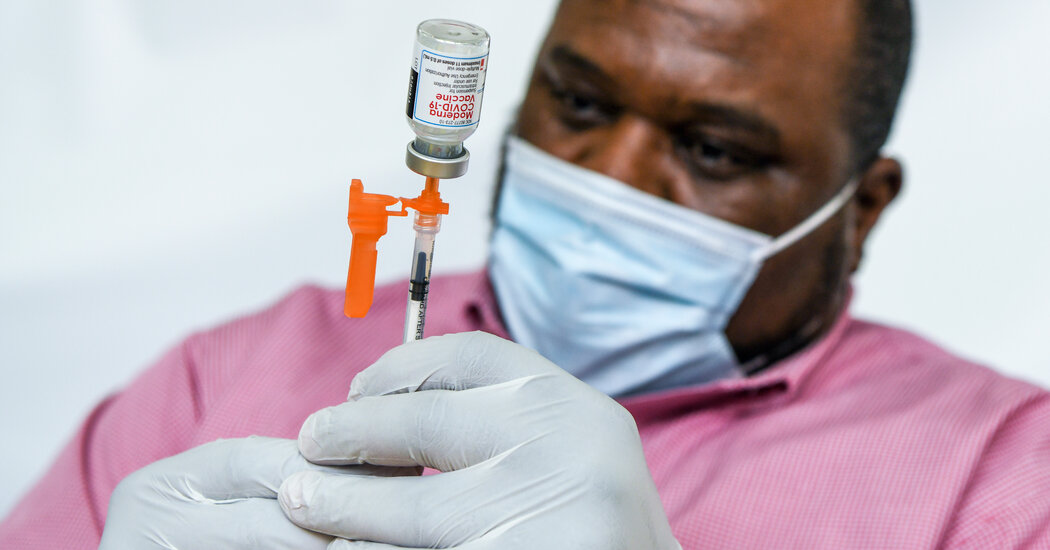Health
Vacunas de refuerzo contra la covid: esto hay que saber sobre la cuarta dosis

“El estudio israelí, en cuanto a la tasa de mortalidad, es decisivo”, dijo Robert Wachter, presidente del Departamento de Medicina de la Universidad de California en San Francisco.
Pero ese estudio, si bien ofrece la única prueba, está plagado de defectos. Todos los participantes se ofrecieron voluntariamente a recibir una cuarta vacuna, y es possible que sean personas que regularmente se preocupan por su salud, dijo Paul Offit, director del Centro de Educación sobre Vacunas del Hospital Infantil de Filadelfia y asesor de la FDA.
“¿Quién toma la decisión de recibir una cuarta dosis? Alguien que está atento a su salud, que es más possible que haga ejercicio, que es menos possible que fume, que es más possible que use una mascarilla”, dijo Offit.
Estos otros factores pueden hacer que la vacuna de refuerzo parezca más eficaz de lo que realmente es. De hecho, otros datos de Israel sugieren que una segunda dosis de refuerzo únicamente tiene beneficios marginales en los jóvenes sanos.
Aplicada cuatro meses después de la tercera dosis, una cuarta inyección restauró el nivel de anticuerpos al mismo pico visto después de la primera dosis de refuerzo, pero no más que eso. Y es possible que este aumento sea efímero, al igual que después de la tercera dosis.
“Será de corta duración, así que creo que el momento de aplicación será la clave”, dijo Marion Pepper, inmunóloga de la Universidad de Washington. “Si no va a crear una respuesta inmunitaria de mayor calidad a largo plazo, entonces se cuestiona un poco el valor”.
Decenas de estudios han demostrado que la mayoría de las personas ya están bien protegidas contra la enfermedad grave. Incluso frente a la variante ómicron, una variante que puede colarse entre las defensas inmunitarias e infectar a las personas, dos o tres dosis de las vacunas de Pfizer-BioNTech o Moderna demostraron ser lo suficientemente potentes como para prevenir la enfermedad grave en casi todo el mundo, según un estudio reciente de los CDC.

Health
Woman who received experimental pig kidney transplant back on dialysis after new organ failed

- Doctors say Lisa Pisano, who received a pig kidney transplant, is back on dialysis after surgeons removed the gradually failing organ.
- Pisano was the second person to receive a kidney from a gene-edited pig after Richard “Rick” Slayman at Massachusetts General Hospital. Slayman died in early May, about two months after his transplant. Doctors said there was no indication he died as a result of the transplant.
- NYU will further study the explanted kidney for further insight on how it reacted inside a living person.
A woman who received a pig kidney transplant is back on dialysis just 47 days later after surgeons removed the gradually failing organ.
Lisa Pisano was the second person to receive a kidney from a gene-edited pig, and NYU Langone Health announced that she is stable after an operation to remove the organ earlier this week.
The first patient to receive a pig kidney transplant, Richard “Rick” Slayman at Massachusetts General Hospital, died in early May, nearly two months after his transplant. Doctors there said there was no indication he died as a result of the experimental transplant.
MASSACHUSETTS MAN DIES 2 MONTHS AFTER BECOMING FIRST PERSON TO RECEIVE SUCCESSFUL PIG KIDNEY TRANSPLANT
Pisano’s heart and kidneys were failing when, in a dramatic pair of surgeries in April, doctors implanted a mechanical pump to keep her heart beating and then the pig kidney.
At first she seemed to be recovering well. But Dr. Robert Montgomery, who led the transplant, said there were “unique challenges” to managing both the heart pump and new kidney. Her blood pressure dropped too low multiple times for optimal blood flow to the kidney.
The kidney lost function until doctors no longer could justify keeping her on immune-suppressing medications, Montgomery said in a statement Friday.
Lisa Pisano looks at photos of her dog after her surgeries at NYU Langone Health in New York on April 22, 2024. Doctors had to remove a transplanted pig kidney from Pisano and put her back on dialysis just 47 days later because the heart disease she also suffers damaged the new organ. (AP Photo/Shelby Lum, File)
A recent kidney biopsy showed no signs of rejection – the biggest concern in highly experimental animal-to-human transplants – but there was “significant injury” from insufficient blood flow, he said. NYU will further study the explanted kidney for further insight on how it reacted inside a living person.
Montgomery noted Pisano wasn’t a candidate for the life-prolonging heart pump while on dialysis, and her heart disease in turn barred a traditional kidney transplant.
“We are hoping to get Lisa back home to her family soon,” he said. “Her strength and bravery in the face of adversity inspires and drives us as we continue pursuing the hope and promise of xenotransplantation.”
Pisano told the Associated Press in April that she knew the pig kidney might not work but “I just took a chance. And you know, worst case scenario, if it didn’t work for me, it might have worked for someone else.”
More than 100,000 people are on the U.S. transplant waiting list, most who need a kidney, and thousands die waiting. In hopes of filling the shortage of donated organs, several biotech companies are genetically modifying pigs so their organs are more humanlike, less likely to be destroyed by people’s immune system.
Formal studies of such organs are expected to begin next year. Meanwhile, NYU and other research teams have temporarily transplanted pig kidneys and hearts into brain-dead bodies, with promising results. In addition to the Mass General pig kidney transplant, the University of Maryland transplanted pig hearts into two men who were out of other options, and both died within months.
Health
Your 2024 New Moon in Gemini Horoscope: What’s in Store for You Come June 6

Sign Up
Create a free account to access exclusive content, play games, solve puzzles, test your pop-culture knowledge and receive special offers.
Already have an account? Login
Forgot your password?
Get back to the Sign In
Use left and right arrow keys to navigate between menu items.
Use escape to exit the menu.
Health
Mental health and stress issues in America get new attention from National Geographic

This month of May, National Geographic has been giving a nod to Mental Health Awareness Month in the U.S. — with a new campaign unveiling a series of mental health check-ups in the form of articles, videos, photography and more.
The material includes downloadable phone backgrounds, ASMR nature YouTube videos, sense-soothing Spotify playlists and a “How Stressed Are You?” questionnaire first developed by psychologists in 1983.
The organization also released a series of think pieces about a culture of urgency in America that is apparently leading to burnout; the efficiency and effectiveness of meditation; and multiple takes on experiencing stress.
NATIONAL GEOGRAPHIC RELEASES ITS ‘PICTURES OF THE YEAR’: SEE SOME OF THE JAW-DROPPING SHOTS
“In our ‘always-on’ world, people are more stressed than ever, and the science is clear that chronic stress has a negative impact on our health,” National Geographic editor-in-chief Nathan Lump said in a media release.
“We aim to help people better understand the effects of stress and encourage them to slow down and take the time to prioritize their mental health,” Lump also said.
He added that he hoped “these resources will encourage and facilitate that behavior.”
The initiative for NatGeo sprouted from a deep dive into how scientists have been attempting to solve stress for generations due to signs that stress can have life-altering consequences, from heart disease to a weakened immune system.
HEART ATTACKS MORE LIKELY DURING PRESIDENTIAL ELECTIONS AND OTHER STRESSFUL TIMES, STUDY SHOWS
In an interview with Fox News Digital, NatGeo contributor Yudhijit Bhattacharjee shared details about his research — noting that “stress is all around us.”
“Stress permeates our lives,” he said. “Stress has some serious impacts on our health, our well-being, even how our brains function, how our immune systems function and so on.”
Since the coronavirus pandemic, Bhattacharjee, who’s based in Takoma Park, Maryland, said it’s become “clear” that social isolation is a “big contributor to stress.”
“When we’re significantly stressed, we’re more susceptible to viruses and germs.”
“In the last 10 to 15 years, there’s been a lot more research on precisely how stress affects us,” he said. “We didn’t know, for example, as clearly as we do now, that stress often plays havoc with our immune system.”
NATIONAL GEOGRAPHIC RANKS TRAVEL DESTINATION FOR NEW ‘WORTH A TRIP’ SERIES: HERE ARE THE TOP SPOTS IN THE US
“When we’re significantly stressed, we’re more susceptible to viruses and germs … and in this post-COVID world, this is definitely very relevant.”
Bhattacharjee’s research also examined how stress can affect adolescents and children.
Aniko Korosi, a researcher at the University of Amsterdam, told NatGeo, “Chronic stress in early life has more serious and lasting effects, because that’s when a lot of connections are being laid down in the brain.”
Raising their triplets is challenging for Caitlin and Chris Nichols of Lawrenceville, Georgia. Born prematurely, the children have long-term health problems. Caregivers of chronically ill children face health difficulties themselves. Telomeres — protective caps at the ends of chromosomes — are shorter than expected, a possible sign of stress-related aging. (Brian Finke/National Geographic)
Experts have discovered, according to Bhattacharjee, that high stress can impede the development of a child’s brain.
“Not much attention has been paid to the impact of stress on babies,” he said. “The stress that parents experience in trying to earn a livelihood, keep a roof over their heads — all of that stress ends up kind of transmitting to their children.”
AMERICANS NEED MORE SLEEP, LESS STRESS, EXPERTS SAY, AS GALLUP POLL REVEALS TROUBLING FINDINGS
“And while the adults can probably cope with the stress and their brains are already fully formed, it’s the children who are going to end up paying a price that lasts their entire lives.”
Bhattacharjee said NatGeo’s campaign is “drawing attention” to what stress is doing to our bodies and our children, as well as advocating for people to “try out their preferred ways of de-stressing.”

Teaching meditation to people at a young age could make a “big contribution” to society, said a National Geographic contributor (not pictured). (iStock)
Meditation — a well-known method of de-stressing — has been embraced more openly by the public and is even being introduced to children in schools, NatGeo reported.
Bhattacharjee assumed that programs like these could make a “big contribution” to society by changing “how humanity responds to day-to-day stress.”
“Scientists are learning exactly how meditation ends up helping to reduce stress and thereby helps to control some of the ill effects of stress,” he said.
ANGER CAN INCREASE HEART ATTACK RISK: ‘CHRONIC INSULT TO ARTERIES’
Bhattacharjee considered other activities to be “meditative” in their ability to control stress, such as playing a sport, singing karaoke, spending time with a pet or going for a walk.
“Meditation is kind of a catchall word for a number of contemplative practices and many of them focus on paying attention to one’s breath and one’s thoughts,” he said.

“I think we need to spend some time just with ourselves feeling bored in order to increase our well-being,” said one expert. (iStock)
The NatGeo contributor said many people today are living in a “frenetic social media environment” while surrounded by issues ranging from environmental to political — making it an opportune time to pay attention to our stress levels and learn how to calm them.
“This constant seeking of stimulation, this addiction to stimulation, is contributing to the stress,” he said.
“[Scrolling is] probably not helping … even if you think that it will entertain you. Maybe that’s just adding to our stress load.”
CLICK HERE TO SIGN UP FOR OUR HEALTH NEWSLETTER
He added, “I think we need to spend some time just with ourselves feeling bored in order to increase our well-being.”
For more Health articles, visit foxnews.com/health.
-

 Politics1 week ago
Politics1 week agoMichael Cohen swore he had nothing derogatory on Trump, his ex-lawyer says – another lie – as testimony ends
-

 News1 week ago
News1 week agoVince Fong wins special election to finish term of former House Speaker Kevin McCarthy
-

 News1 week ago
News1 week agoVideo: Midwest Storms Destroy Homes
-

 World1 week ago
World1 week ago€440k frozen in Italy over suspect scam by fake farmers
-

 News1 week ago
News1 week agoBuy-now, pay-later returns and disputes are about to get federal oversight
-

 News1 week ago
News1 week agoRead the I.C.J. Ruling on Israel’s Rafah Offensive
-

 News1 week ago
News1 week agoVideo: Protesters Take Over U.C.L.A. Building
-

 World1 week ago
World1 week agoOmbudsman probes Commission's senior staff 'revolving door'















